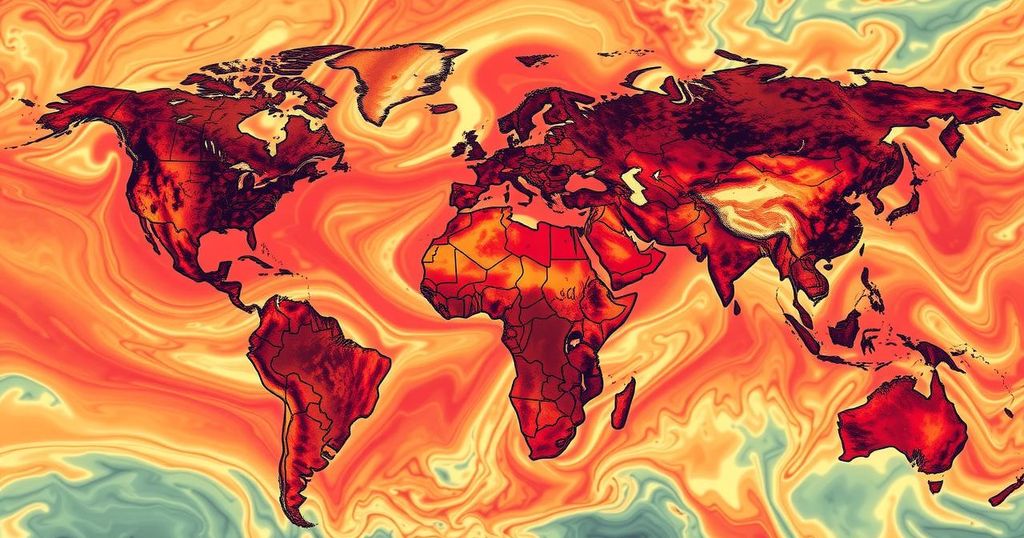Climate Change Causes 41 Days of Extreme Heat Worldwide in 2024

In 2024, an average of 41 additional days of dangerous heat were recorded worldwide due to human-induced climate change, likely making it the hottest year on record. The findings from World Weather Attribution and Climate Central revealed that climate change worsened various extreme weather events, impacting millions globally. Notably, 26 out of 29 examined extreme weather events had clear links to climate change, raising serious concerns about future climate trends.
In 2024, the world experienced an alarming average of 41 additional days of dangerous heat due to human-induced climate change, as reported by scientists from World Weather Attribution and Climate Central. This year has set a new record for global temperatures, which may make it the hottest year recorded, coinciding with an increase in extreme weather events impacting millions globally. Researchers indicated that climate change intensified various phenomena, including heatwaves, droughts, tropical cyclones, and heavy rainfall, resulting in devastating effects on lives and livelihoods. Friederike Otto, a prominent climate scientist, emphasized the link between fossil fuel consumption and exacerbated climate conditions.
The excessive heat affected various regions throughout the year, with incidents of extreme high temperatures noted in Northern California, Mexico, Western Africa, and Southern Europe, among others, prompting school closures and emergency measures. For instance, Greece had to close historical sites like the Acropolis to protect public health amid soaring temperatures. The analysis conducted by the international research team drew comparisons between 2024 temperature data and hypothetical scenarios absent of climate change to establish these alarming findings.
A considerable number of regions reported severe heat for over 150 days, disproportionately affecting less developed nations, as outlined by Kristina Dahl, Climate Central’s vice president of climate science. The scientists also voiced concerns regarding underreporting of heat-related fatalities, urging for better public awareness regarding such risks. Otto remarked that heatwaves remain one of the most lethal extreme weather events, significantly influenced by climate change.
2024 served as a critical warning, with indications that global temperatures are nearing the limits set by the Paris Agreement of 1.5 degrees Celsius above pre-industrial averages. Out of 29 scrutinized extreme weather events responsible for at least 3,700 fatalities, 26 exhibited clear links to climate change. While the El Niño phenomenon contributed to altering weather patterns, researchers concluded that climate change was the more significant factor in the year’s climatic events. Expert Jennifer Francis reiterated the urgency for reducing greenhouse gas emissions to combat the increasing intensity and frequency of extreme weather.
The findings presented by the scientists illustrate the direct consequences of human-induced climate change, highlighting its role in exacerbating extreme weather events globally. As 2024 continues to break weather records, it underlines a concerning trend where rising temperatures lead to more frequent and intense heatwaves, adversely affecting human health and safety. The year serves as a crucial data point in climate research, reflecting patterns that align with an overall upward trajectory in global temperatures. Furthermore, the impact of climate change is unevenly distributed, with poorer nations facing the brunt, pointing to the need for global cooperation in addressing the impending climate crisis.
In summary, the alarming increase of 41 days of extreme heat worldwide in 2024 underscores the urgent need for effective climate action. The patterns observed highlight the direct link between climate change and severe weather phenomena, which not only devastate communities but also threaten global health. As climactic extremes become more common, the ongoing reliance on fossil fuels exacerbates the situation, calling for immediate measures to reduce emissions and implement climate adaptation strategies across all nations.
Original Source: www.theweek.in






